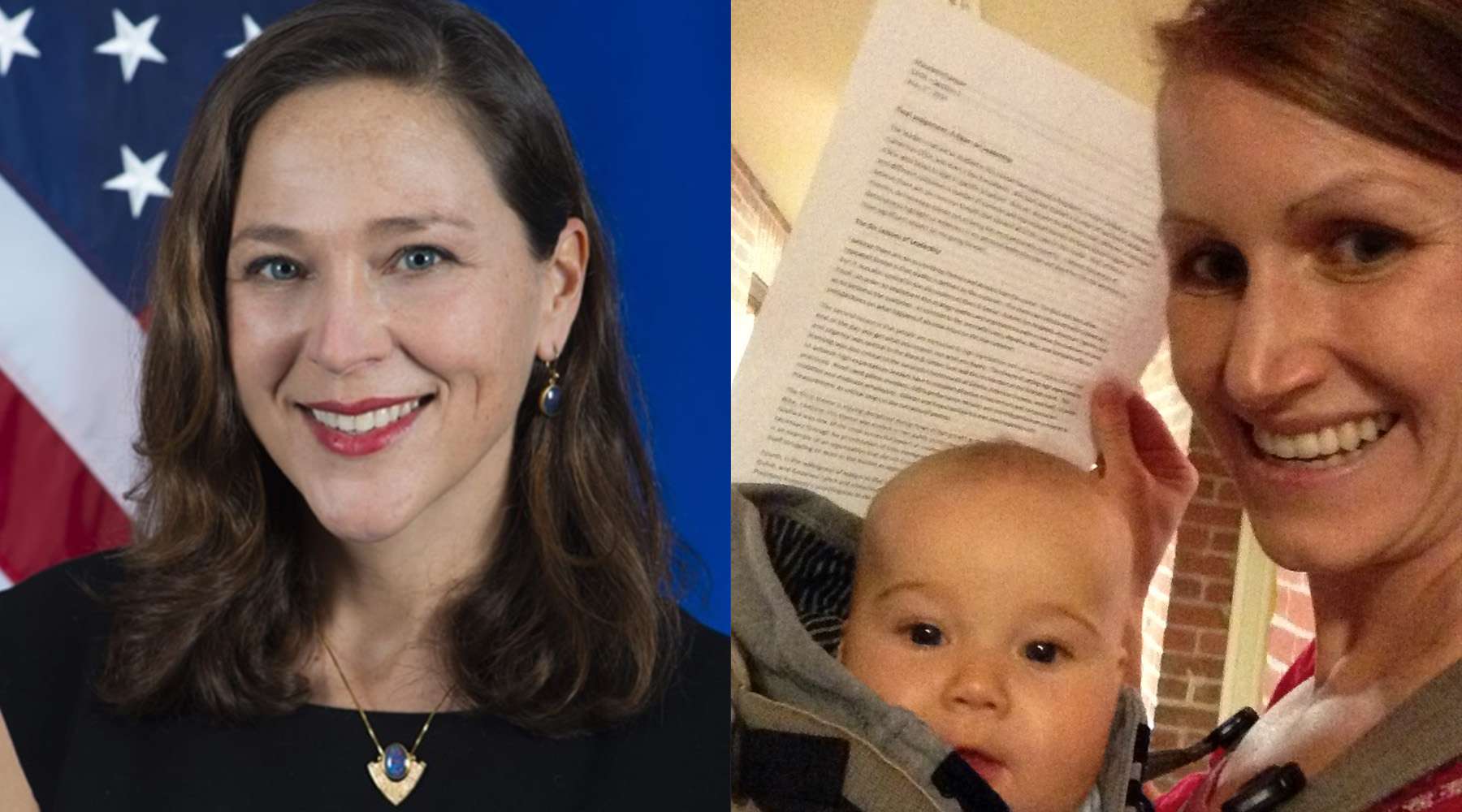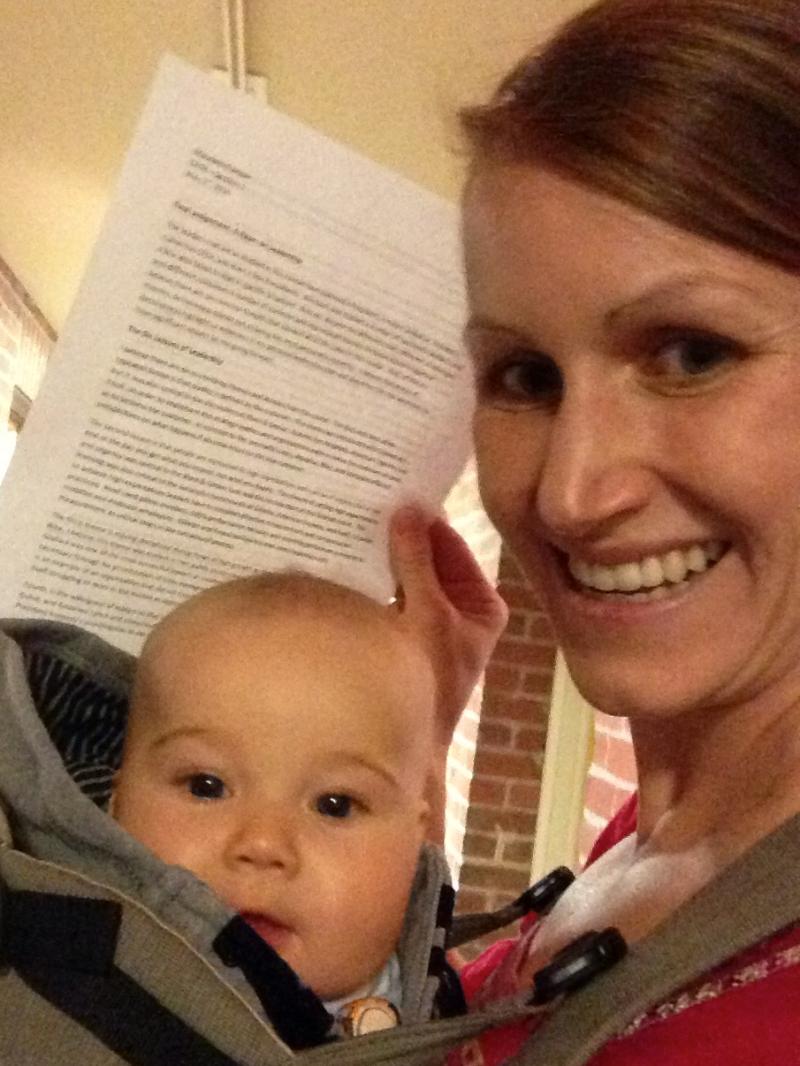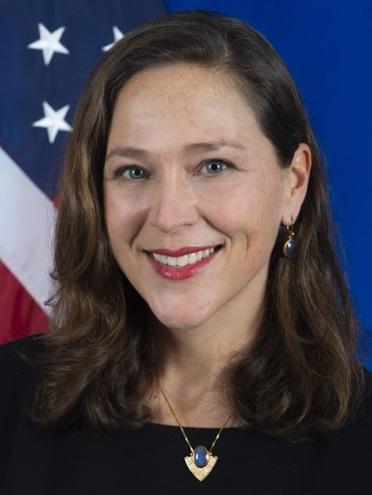
Tuck Women in Business (WIB) sat down with cofounder Maureen Gartner T’14 and Professor Emily Blanchard to hear more about their career journeys, advice for handling transition, and sources of inspiration.

VP of Finance and Growth at ThirdWay Capital & cofounder of the Tuck Women’s Symposium (formerly the Tuck Initiative for Women)
It’s hard to believe it’s been 10 years already (although there is someone who helps me track the time—I’ll mention him later). When I think back to the inspiration for the Initiative for Women it brings me back to the fall of my first year. My husband and I were both in the class of 2014 and we went through the Tuck journey together. While we had very similar backgrounds—both college athletes, both worked in finance, and both introverts—I very quickly realized we had different approaches to the challenges of the MBA program. For the first time, we were tackling the same challenges (same cases, same classes, etc.) and I saw some things become stumbling blocks for me while seeming like simple hurdles or stepping stones for him.
This experience was frustrating, but it also motivated me and sparked my curiosity about the differences. In sharing my experience, I found that I was not alone, and we gathered a group of like-minded women and allies. Out of this group evolved the idea of the Women's Symposium which had the following objectives (thanks to Dropbox I found our initial proposal):
The three components of the initiative were learning, teaching, and connecting and the goal was to gain institutional support an expansion of Women in Business at Tuck. Alongside my cofounder, Stephanie O’Brien, we organized the first Women’s Symposium in the spring of 2014. It’s amazing to see the growth and impact that the event and the Women in Business club (WIB) are making today at Tuck and beyond.
The inspiration for the event started with a personal experience, and it continues as a personal experience. I started Tuck with my husband, and I graduated Tuck as a new mom of a 6-month-old. (My son Logan just turned 10 so it’s time for our Tuck 10-year reunion!)
Post-Tuck, we moved to Toronto, and I jumped back into the workforce as a new mom balancing two careers. Just when it felt like we’d achieved the balance of two kids in elementary school and multiple careers, the pandemic hit. In Toronto, we had three extended school lockdowns into June 2021. During that time, I stepped away from my job to support the family. I was and am thankful for the time and ability to support my family, but it was a decision I didn’t expect to make, and it was a decision that turned the statistics of women who left the workforce during the pandemic into a personal experience. Like many others, I have since returned to work and I’m working for an Impact Investing Firm, ThirdWay Capital, although with a lot more flexibility than I had before.
Through each of these transitions, I’ve been grateful for my experience at Tuck and especially with WIB at Tuck. I have often leaned on the learnings, wisdom, and advice of classmates and alumnae, and I’m so grateful to get reconnected, to reminisce about the kick-off of the Women's Symposium and to be inspired by all of you.

Associate Professor of Business Administration at Tuck
WIB was delighted to sit down with Professor Emily Blanchard, who returned to Tuck for the winter term after spending two years at the State Department serving as chief economist. “I’ve taught a research-to-practice for years. The ‘to practice’ really is next level when you go into policymaking, where big ideas meet reality,” she says.
Blanchard has been presented with opportunities to work in public service in the past, but until a few years ago, either the timing or the role was not quite right. After considering what was right for her family and the status of major research projects, she decided it was time to take the leap: “I didn’t go in with a laundry list of what I wanted to do; I didn’t need to promote my brand … I went in with two goals: learn and serve.”
Over her two years at the State Department, Blanchard says she became even more convinced of the relevance and importance of what—and how—she and her colleagues teach economics, particularly GEM frameworks, to first-year students at Tuck. “The world we live in is so complicated,” she emphasizes. “We need frameworks to organize ideas and to think logically and systematically.”
While the transition back to teaching has been relatively smooth, and she is very much enjoying being back with her family, she misses working with her team of talented economists in the fast-paced trenches of interagency policymaking and diplomacy.
Solving problems within the complex structures of the government was often difficult amid a mind-bendingly complex institutional hierarchy. Blanchard adopted an entrepreneurial academic’s strategy—seeking out talent and good ideas wherever they might lie in the institutional org chart—and found rich rewards for this unconventional approach. “One of the greatest lessons of my two years in government service is how fortunate we are in the United States to have fiercely committed and talented public servants—civil service, foreign service, and the armed forces—who work for less than market wage and suffer unending frustrations of navigating bureaucracy, simply because they believe in the mission of public service,” she says.
Along with the insights gained working on complex policymaking, Blanchard also learned a lot about managing people. When asked what advice she would give to Tuckies who will be managing teams in the future, she stresses the importance of empathy: “You've got to figure out where people are coming from to bring them along with you. You don’t do that by shaming them or scaring them, you do it by understanding where they are and, step-by-step, explaining why you’re not in the same place and why they should come along to your side.”
To close our conversation, we ask about her role models. “I have many role models,” she shares. “I try to find people, things, and actions to admire everywhere. I look at the little acts of brilliance that come from many people and many places, every day.” That said, Blanchard acknowledges that she does have a North Star in her parents, especially her mother, noting her unshakeable strength, compassion, and thoughtfulness. “She’s unapologetic about being a decent human being…and that’s a great starting point.”
The Tuck Women in Business (WIB) club provides mentorship, networking, and career development opportunities for current students. It is an inclusive community focused across social, professional, and academic pillars meant to foster discussion and further gender equity.
To learn more about WIB and the Tuck experience of current students, please reach out to our WIB Club leadership team or one of our Tuck Ambassadors by using this website to filter by club interest.